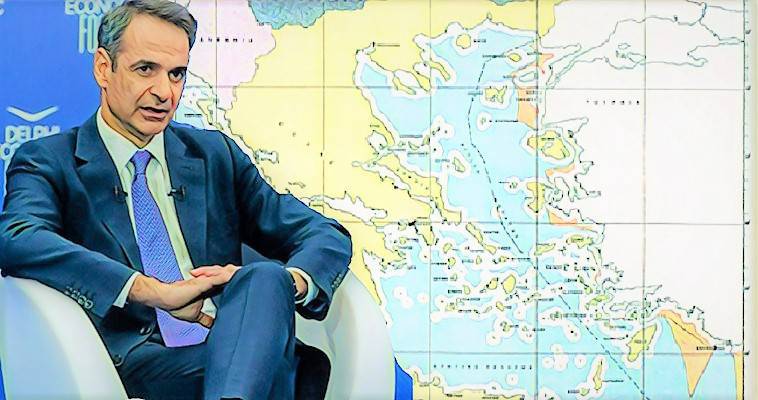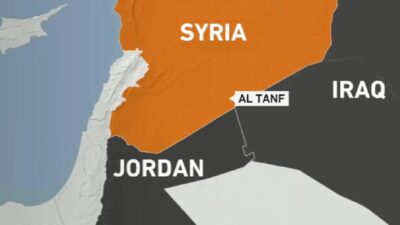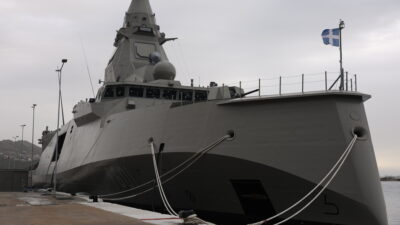Stavros Lygeros: Turkey has already delineated an EEZ and Athens is still talking Hague!
14/06/2020
Last February, ELIAMEP organized an event on the referral to The Hague, as a way to resolve the Greek-Turkish conflict. Speakers were people who have handled Greek-Turkish relations (George Papandreou, Dora Bakoyannis, Katrougalos and Rozakis). That event once again confirmed that almost the entire Greek political system has turned the referral to the International Court of Justice into a one-way street.
A few days after that event, Turkey launched its hybrid attack on Evros organizing and weaponizing immigrants. That attack underlined in its own obvious way how immersed in its delusions and strategic discomfiture the Greek political system is. And this was confirmed by what followed. The events in Evros may have temporarily banished the talk on The Hague from the forefront, but they did not cancel it.
One verification is the current relevant statement of the Prime Minister at the Delphi Forum. Although Ankara has announced that it is conducting research outside the Greek territorial waters on the Kastellorizo-Rhodes-Karpathos-Kassos-Crete arc, although we are facing a new Greek-Turkish crisis, Mr Mitsotakis is returning to the path of The Hague. Maybe because of his strategic quandary.
The fact, however, is a revelation of the climate that is prevalent among the ruling elites. If one listens to Greek politicians, academics and journalists, one will think that Ankara is asking for a referral to The Hague and Athens is discussing whether to accept it or not! The reality, of course, is the opposite. Due to the phobic syndrome and strategic embarrassment in Athens, these elites systematically create a false image.
In fact, when a Turkish official mentions The Hague, they rush to highlight this statement in order to give a realistic background to their rhetoric. Ankara’s firm position, however, is clear: it must first be preceded by a bilateral negotiation of all unilateral Turkish expansionist claims. Unless it is possible and conditional that all “disputes” be referred to the International Court of Justice. (ie the Turkish unilateral claims), with the exception of the “gray zones”, which have now become Turkish “gray” zones according to the official rhetoric of Ankara.
The terms of Ankara are an obstacle
When Cavusoglu sporadically mentions The Hague as a theoretical perspective, he is offering the “cheese” in a trap meant to drag Athens into negotiation. For the referral to the International Court of Justice, moreover, a mutual agreement is required, because Turkey has not recognized its jurisdiction, as Greece has done. Many years of exploratory contact have shown that the obstacle to signing a co-promise was and remains the conditions set by Ankara.
He uses the term “incidental issues” not without reason. In order for the continental shelf-EEZ to be delimited, the two sides must agree on which lands belong to one and which to the other, since the demarcation of the maritime zones is based on the territories. Turkey, however, claims many inhabited islands (Oinousses, Fourni, etc.), officially declaring that they are Turkish under Greek occupation!
Therefore, the delimitation of the continental shelf-EEZ cannot be done by the International Court of Justice, unless Greece agrees to put in the judgment of foreign judges whether these islands will remain in Greek territory or be handed over to Turkey! This parameter arose after 1996 and not before, when Konstantinos Karamanlis and Andreas Papandreou requested a referral to The Hague. Today, however, any politician, academic or journalist who raises the Hague banner must clarify whether he/she agrees to be judged by foreign judges on whether or not inhabited islands are part of Greek territory. Everything else “smells” of malice.
Ankara wants “justice”
Since the 1970s, Ankara has been demanding that the mutual agreement for referral under consideration should indicate to the International Court of Justice how it will delimit these issues. To be precise, to commit it will apply the principle of “equity”. This principle is provided for in the case where two States consider that it is in their mutual interest for a dispute not to be judged on the basis of the general rules of international law, but in a manner which they will indicate to the International Court of Justice. Ankara is essentially asking Athens to co-sign that the sovereign rights provided by international law in Greece will be bypassed! This emerges from the minutes of the exploratory contacts.
The governments of Costas Mitsotakis, Costas Simitis, George Papandreou, Alexis Tsipras and now Kyriakos Mitsotakis, who proposed / are proposing a recourse to The Hague as a realistic policy, have been at the helm for many, many years. They have to answer the following question: Why didn’t they go to The Hague when they ruled? Why didn’t they sign a mutual agreement? Why what turned out to be impossible in their day is now possible? Have Turkish intentions changed for the better?
The answer is simple. Ankara is demanding so much that even those Greek leaders who are willing to make discounts on Greece’s sovereign rights cannot give them such. But why do they insist on proposing such a recipe, which when they applied it themselves it failed to lead to a mutual agreement and referral to The Hague?
Legal differences and political problems
Clearly, Athens recognizes as the only Greek-Turkish dispute the demarcation of the continental shelf-EEZ and is requesting a referral only for that issue – without the mutual agreement to make suggestions – to The Hague. This means that if the dispute is referred to the International Court of Justice and it decides e.g. to give Castellorizo a reduced impact on the continental shelf-EEZ, Greece is obliged to respect the decision.
Since the 1970s, when Athens proposed a referral to The Hague, it has accepted the possibility of some small islands being affected. This is not at all unlikely, as the case law of the International Court of Justice has shown. The law of the sea, after all, does not provide for the principle of the middle line as the sole criterion for delimitation. At the same time, it provides for the principle of proportionality. The reason why I, at least, question The Hague as an option is not this possibility, but the terms set by Ankara (“gray zones” and equity).
The fact that Athens recognizes only one legal difference does not mean that it denies the existence of other Greek-Turkish problems. These are, however, political problems arising from unilateral Turkish expansionist claims. This permanent Greek position, however, is now showing cracks. Turkish expansionism, promoted by military pressure, has cowed Athens. Using the pretext of being realistic, the Greek political system has been forced into a revision in the direction of partial adaptation to Turkish claims.
Anyone who thinks he is being wronged should go to The Hague
Greek politicians are whispering and big business is directly telling their collocutors that this adjustment is the only way. In fact, they have gone so far as to assess Turkey’s expansionist claims as legitimate and unlawful, legitimizing several in this way. They often put forward the following argument: since Greece has a strong legal position, why not accept the referral to The Hague of all Greek-Turkish “disputes” (they avoid mentioning that among them are Turkey’s territorial claims)?
The answer is that the International Court of Justice’s rulings have shown that political criteria are at stake, especially if the mutual agreement leaves room for maneuver, as Ankara has sought. I emphasize that the ruling of the Hague will judge exclusively on Greek sovereign rights, or lack thereof. This means that Athens has only to lose and Ankara has only to win.
After all, it is not Greece that is claiming to request a referral to The Hague of Turkish claims. If Turkey considers that it is being wronged by the current legal regime, let it recognize this jurisdiction of the International Court of Justice and let it refer its claims there. Greece has recognized its jurisdiction.
All of the above, however, are stale news. Erdogan has upped the ante and Athens remains attached to the past. The Greeks clash with each other over The Hague, when this ball has left the field. With the Ankara-Tripoli memorandum, Turkey has demarcated a continental shelf-EEZ in the region east and south of Crete, even if the principle used by both sides (the islands are not entitled to a continental shelf-EEZ) is outside international law.
It is clear that Erdogan is not going to cancel the agreement in order to go to The Hague. He sought it in order to implement it. He therefore announced the conduct of research (and the continuation of drilling) in order to create a fait accomplis. The same political will can also be seen in the submission of coordinates to the UN on the borders of the Turkish continental shelf in the Eastern Mediterranean.
Territorial waters regulation
Another issue is that according to the case law of the International Court of Justice (Qatar-Bahrain case), if the continental shelf is demarcated on the basis of six miles of territorial waters, Greece will probably lose its right to extend it to 12 miles. Extension is a conventional right of every state and is exercised unilaterally. It has been practiced by all coastal countries, with the exception of Greece, due to the Turkish casus belli.
So, since Greece has actually succumbed to the threat of war, and since Erdogan has risen to the level of expansionism, let Greece do what it can, without adventures:
- From now on, talk about EEZs and not about the continental shelf.
- Bays must be closed with straight base lines (2-3% of the Aegean will become Greek territorial waters).
- To expand territorial waters to 12 miles in the Ionian, Libyan, Cretan, Peloponnese and western Aegean. Let there be six left in the east to negotiate a compromise if the time ever comes.
- Finally, to submit coordinates to the UN (based on the principle of the middle line) for the limits of the Greek EEZ in the Eastern Mediterranean as Athens considers them. This is not a unilateral demarcation, but a necessary response to record the Greek-Turkish dispute.
Greece seeks detente and peace. But the intent of one side is not enough. It takes two to tango. Turkey is taking a different path. Because Greece cannot pack up and move to the Atlantic, we are obliged to live, in the face of a bad neighbor. Unless, of course, we decide to succumb to its expansionist claims and become a satellite of Turkey. Anyone who supports it should say so clearly. Everything else is misleadingly false and only a way for some people in power to shirk off their national responsibilities





